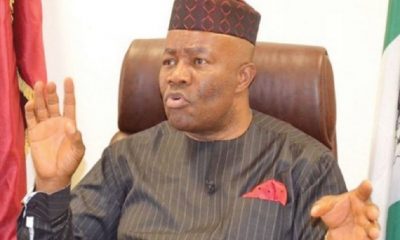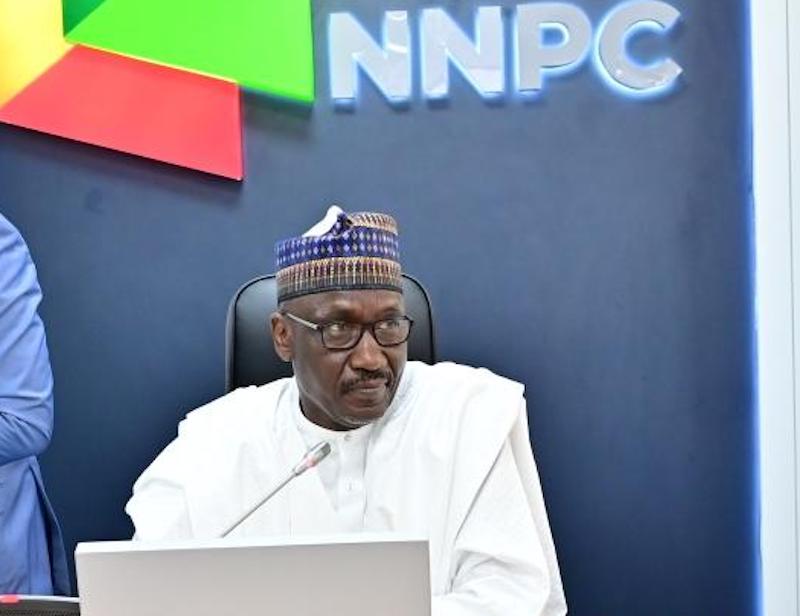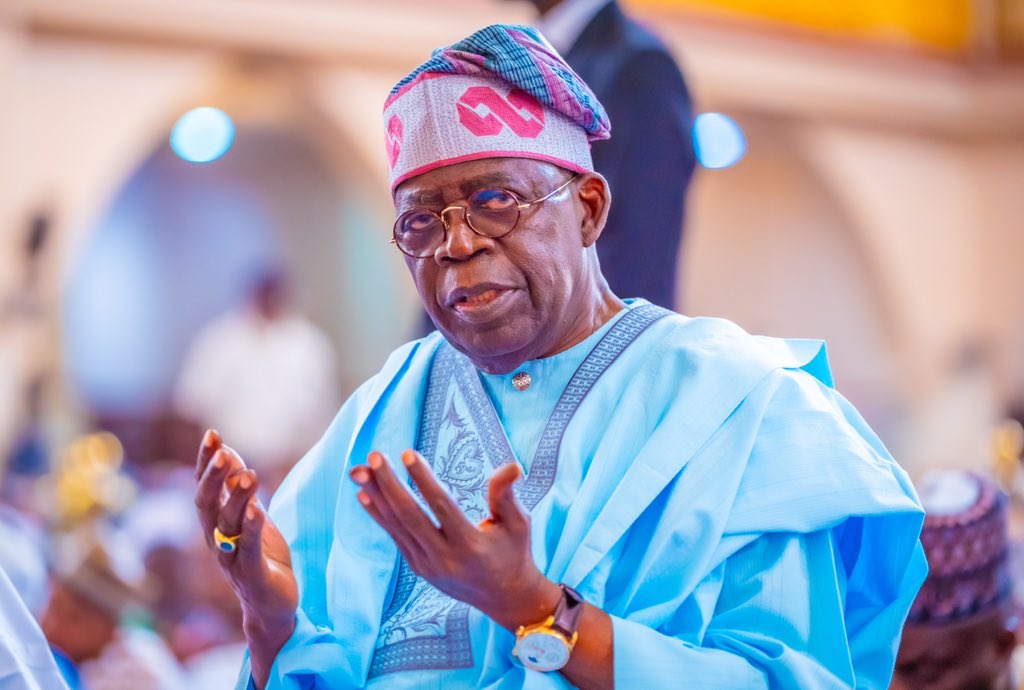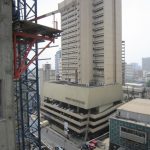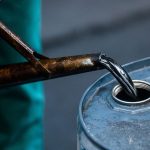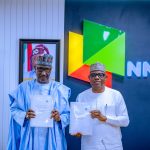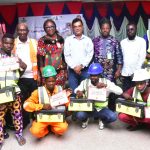General
SERAP Asks Buhari to Investigate Poverty Alleviation Programmes
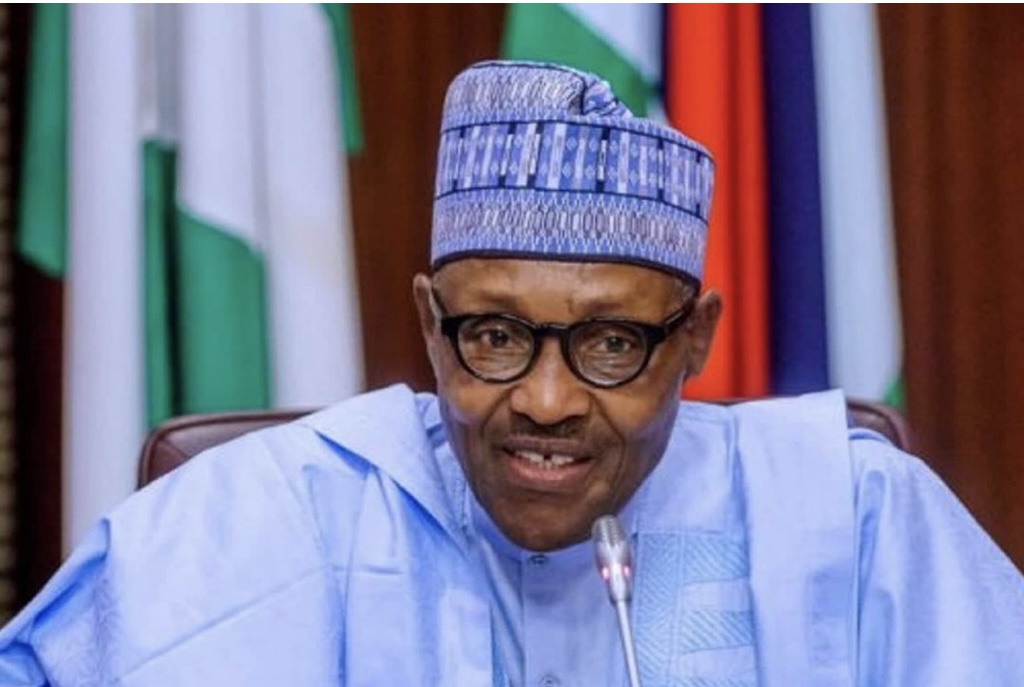
By Adedapo Adesanya
Socio-Economic Rights and Accountability Project (SERAP) has urged President Muhammadu Buhari to investigate his administration’s poverty alleviation programmes following the disclosure that over 130 million Nigerians are multidimensionally poor.
In a letter dated November 19, 2022, and signed by SERAP deputy director, Mr Kolawole Oluwadare, the organisation charged the president to “promptly set up a presidential panel of enquiry to thoroughly, impartially, effectively and transparently investigate spending on all social safety nets and poverty alleviation programmes and projects executed between 2015 and 2022.”
SERAP also urged him “to ensure the findings of any such investigation are widely published, and suspected perpetrators of corruption and mismanagement of public funds meant to take care of the poor should face prosecution as appropriate, if there is sufficient evidence, and any stolen public funds should be recovered.”
A recent report by the National Bureau of Statistics (NBS) showed damning revelations that some 133 million Nigerians are poor, despite the government reportedly spending N500 billion yearly on ‘social investment programmes.’ Half of all poor people in the country are children.
The organisation said, “The report suggests a grave violation of the public trust and the lack of political will to genuinely address poverty and uphold your government’s constitutional and international human rights obligations.”
SERAP said, “The report that 133 million Nigerians are poor suggests corruption and mismanagement in the spending of trillions of naira on social safety nets and poverty alleviation programmes, including the reported disbursement of over $700 million from the repatriated Abacha looted funds to these programmes.”
“Your government has legal obligations to effectively and progressively address and combat extreme poverty as a matter of human rights.”
“The failure to address extreme poverty has resulted in high levels of inequality, and serious violations of economic and social rights of Nigerians, particularly the socially and economically vulnerable sector of the population,” it added.
The letter, copied to Mr Olivier De Schutter, UN Special Rapporteur on extreme poverty and human rights, read in part: “These grim revelations by the NBS show the failure to fulfil your oft-repeated promise to lift 100 million Nigerians out of poverty, and that no one will be left behind.
“We would be grateful if the recommended measures are taken within seven days of the receipt and/or publication of this letter. If we have not heard from you by then, SERAP shall take all appropriate legal actions to compel your government to comply with our request in the public interest.
“The report also shows that the purported social safety nets and poverty alleviation programmes are clearly not working. It also shows a failure by your government to uphold the constitutionally and internationally guaranteed human rights of the Nigerian people.
“SERAP also urges you to prioritise investment in quality education and healthcare and to redirect some of the unnecessary spendings in the 2023 budget, such as spending by the presidency on feeding and travels, and money allocated to the National Assembly in the budget to address poverty as a human rights issue.
“A supplementary appropriation bill, which reflects the proposed redirected budget, should be urgently sent to the National Assembly for its approval.
“Your government has a sacred duty to ensure transparency and accountability in the spending of the country’s resources, including the spending of public funds on social safety nets and poverty alleviation programmes and projects.
“Section 14(2)(b) of the Nigerian Constitution of 1999 [as amended] provides that, ‘the security and welfare of the people shall be the primary purpose of government.’
“Under Section 16(1)(a)(b), your government has the obligations to ‘harness the resources of the nation and promote national prosperity and an efficient, a dynamic and self-reliant economy’, and to “secure the maximum welfare, freedom and happiness of every citizen.
“Nigeria has also ratified the African Charter on Human and Peoples’ Rights and the International Covenant on Economic, Social and Cultural Rights, which recognize legally enforceable economic and social rights, such as the rights to education, health, safe food and clean water, security, and shelter.
“Allegations of corruption in social safety nets and poverty alleviation programmes pose both direct and indirect threats to human rights and contribute to extreme poverty in the country.
“Nigerians have the right to be free from poverty. Extreme poverty is the greatest denial of the exercise of human rights, as it denies millions of Nigerians not only their economic and social rights but also civil and political rights such as the rights to life, human dignity, and political participation.
“Political freedom and participation are closely related to human development. Without economic and social rights, people cannot effectively enjoy their political freedom. Therefore, effectively and progressively addressing poverty would improve the ability of Nigerians to exercise their political freedom and to have choices in life.
“Successive governments have systematically neglected social and economic rights and failed to address severe poverty and inequality in the country.
“Part of the problem is the failure by your government to promote the legal recognition of economic and social rights in the Nigerian Constitution, which would allow people living in poverty to seek redress for violations of their human rights.
“The allegations of corruption and mismanagement in the spending of public funds on social safety nets and poverty alleviation programmes and projects would clearly amount to a fundamental breach of national anticorruption laws and the country’s international anticorruption obligations.
“Investigating and prosecuting the allegations and recovering any stolen public funds would serve the public interest.
“SERAP notes that the consequences of corruption are felt by citizens on a daily basis. Corruption exposes them to additional costs to pay for health, education and administrative services.
“Corruption undermines the economic development of the country, trapping the majority of Nigerians in poverty and depriving them of employment opportunities.
“The 2022 Multidimensional Poverty Index (MPI) Survey reveals that 65 per cent of the poor (86 million people) live in the North, while 35 per cent (nearly 47 million) live in the South. Poverty levels across States vary significantly, with the incidence of multidimensional poverty ranging from a low of 27 per cent in Ondo to a high of 91% in Sokoto.
“The NBS also shows that over half of the population of Nigeria are multidimensionally poor and cook with dung, wood or charcoal, rather than cleaner energy. High deprivations are also apparent nationally in sanitation, time to healthcare, food insecurity, and housing. Half of all poor people are children.”
General
Ojulari Vows to Consolidate on Mele Kyari’s Legacy
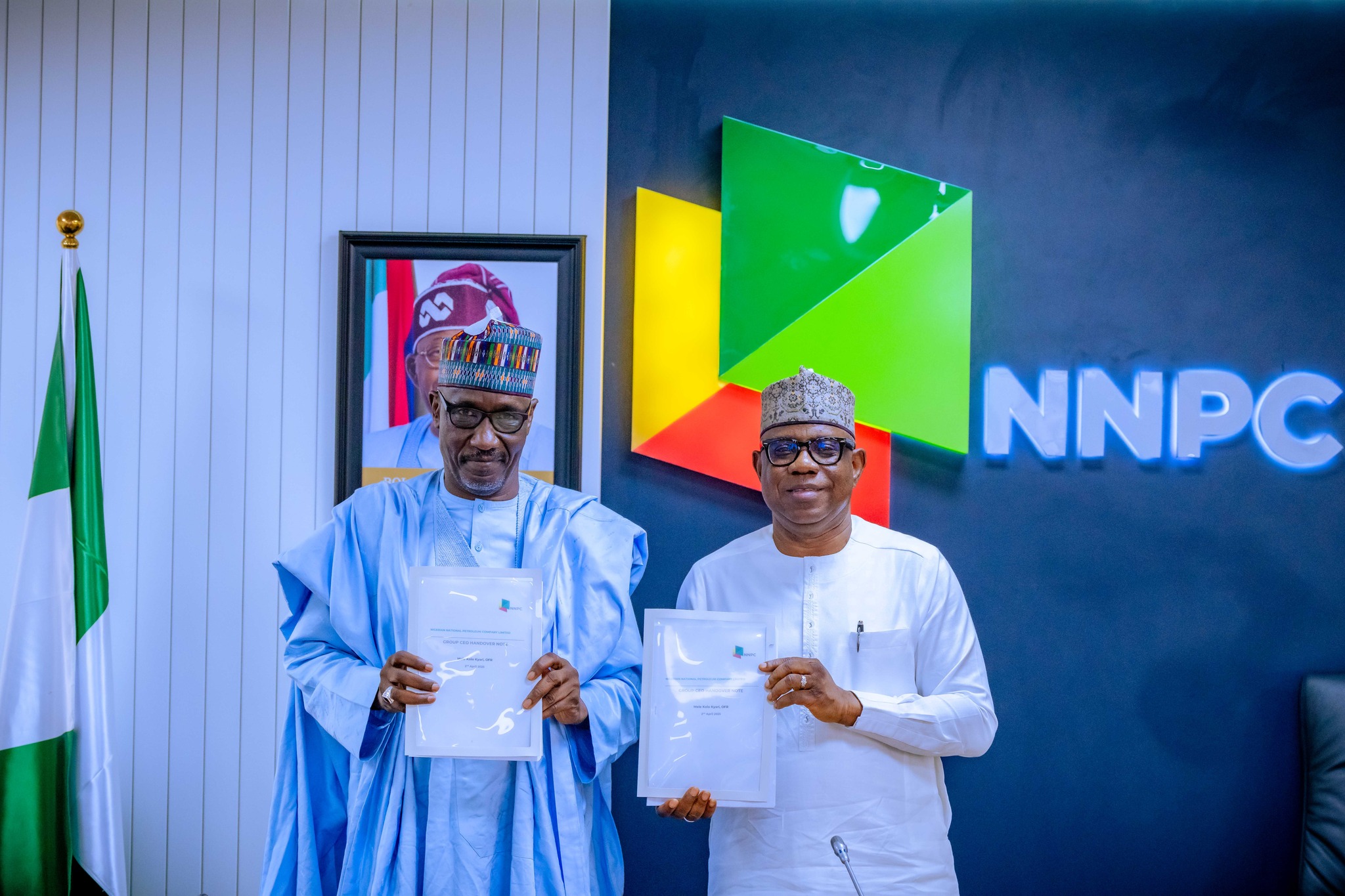
By Modupe Gbadeyanka
The new chief executive of the Nigerian National Petroleum Company (NNPC) Limited, Mr Bayo Ojulari, has promised to consolidate on the legacy and achievements of his predecessor, Mr Mele Kyari.
He made this pledge while taking over from Mr Kyari on Friday at the organisation’s headquarters in Abuja, the country’s seat of power.
President Bola Tinubu on Tuesday dissolved the board of the NNPC and appointed new members to pilot affairs of the oil company.
In a statement today by the Chief Corporate Communications Officer of the NNPC, Mr Olufemi Soneye, it was disclosed that the new CEO praised Mr Kyari for his contributions to the growth of NNPC Ltd and his sterling service to the nation, noting that the objective of his management is to consolidate on the successes of his predecessor and take the company to the next level.
He said though the targets set for his management were quite enormous, he would be relying on the co-operation of the Management and staff of the company, as well as the counsel of his predecessor to achieve set targets.
“I will be counting on your support. I will need it. I will be coming around to seek your counsel,” Mr Ojulari told Mr Kyari.
Earlier in his remarks, the erstwhile NNPC chief congratulated his successor and thanked the management and staff of the company for their support while in office, vowing to do everything within his power to support the new team to succeed, stressing he is only a call away.
General
Dangote Cement Ibese Plant Empowers Host Communities
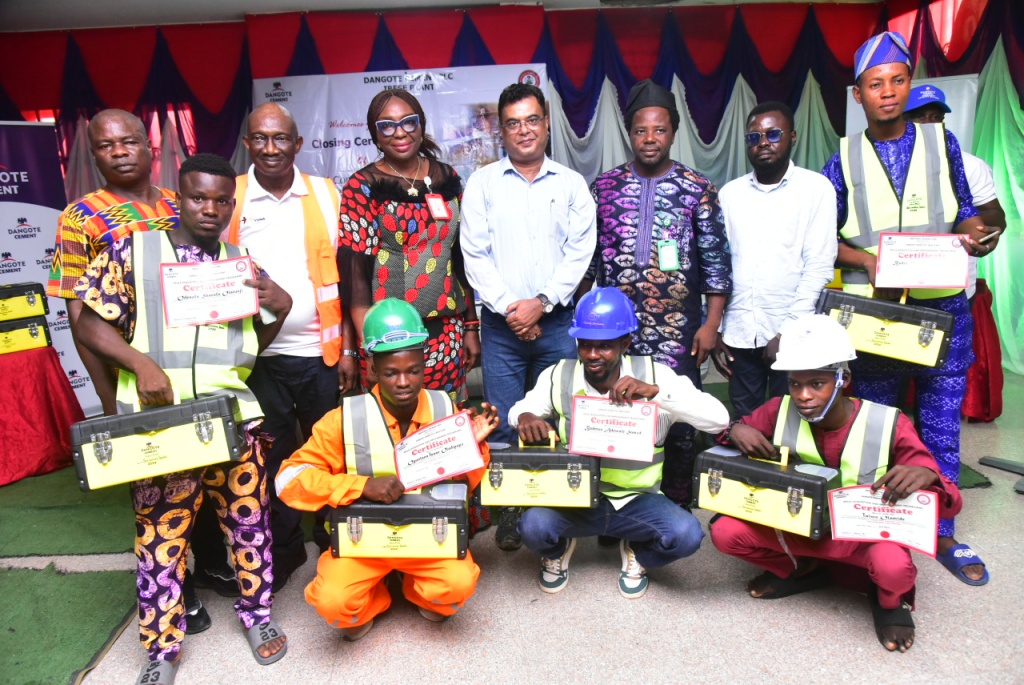
By Aduragbemi Omiyale
Some persons living around the Ibese Plant of Dangote Cement Plc have been equipped with some skills that could make them stand on their own and contribute to the economic development of Ogun State and Nigeria in general.
The beneficiaries participated in the 2024 Youth Skill Acquisition and Empowerment Programme designed to give back to society.
This initiative, executed under the Community Development Agreement (CDA) with host communities by Dangote Cement, according to the federal government, is worthy of emulation.
The Minister of Solid Mineral Development, Mr Dele Alake, while speaking through the South-West Zonal Coordinator for Mines Environment Compliance for the Ministry, Mr Mathew Ochimana, praised the cement maker for the diligent execution of the agreement for the benefit of the rural communities, thereby fostering atmosphere of peace all year round.
While presenting certificates and starter packs to the trainees, the Minister said the government had no cause to wade into any dispute between the company and host communities.
He urged Dangote Cement to continue to partner with the host communities with more empowerment programmes to develop the communities and equip the people.
Mr Alake enjoined the host communities to reciprocate the good gesture by maintaining peace and supporting the company to do more.
Speaking in the same vein, the Chairman of Host Communities Joint Consultative Committee, Mr Dayo Ogunyinka, thanked Dangote Cement for always rising up to the occasion noting that the company has never shied away from its social responsibilities by constantly developing programmes that could lift the people and add value to them.
“I can remember we have gathered here before to graduate thos who were trained in the art of electrical electronics, those who specialized in shoe making, those who chose acupuncture, and today its painting and Plaster of Paris (PoP).
“Worthy of mentioning is the fact Dangote Cement, Ibese Plant don’t just train, they also provide the starter pack to start for the graduands to start working straightaway, we cant ask for less. I am however saddened that some of our youths run away from this lofty training by not presenting themselves.
“We are very lucky in our communities to have Dangote Cement here, they not only cater for the youths, they do for the wome, the elderly, the farmers and others, we are indeed lucky. We can only pray that God will continue to be with the organization,” he stated.
Addressing the youths earlier, Dangote Cement Ibese Plant Director, Mr Roy Uttam, explained that the training initiative was a partnership between Dangote Cement Plc and the Industrial Training Fund (ITF), Abeokuta Area Office, and that it underscored the company’s commitment to socio-economic development in its host communities.
He reaffirmed the company’s dedication to corporate social responsibility, emphasizing its focus on Health, Education, Infrastructure, and Empowerment, noting that the Dangote Academy and various training programs have continued to create employment opportunities and enhance skill acquisition among Nigerian youths.
He commended the thirty (30) graduates from the 17 host communities who successfully completed training in Plaster of Paris (PoP), screeding, and painting, urging them to utilize their newfound skills to build sustainable careers. The trainees received start-up kits, including tools such as trowels, measuring tapes, and shovels, to aid them in establishing their businesses.
Also speaking at the event, the ITF Area Manager, Abeokuta, Mrs Abolanle Ajibade, thanked Dangote Cement for the initiative, adding that, “It is with a sense of accomplishment that I stand before you to bring this impactful 2024 skills acquisition and empowerment training program to a close.
“This training program, PoP, screeding, and painting, was not merely an opportunity to gain knowledge but also an avenue to forge connections, share experiences, and challenge ourselves to go beyond our comfort zones.
“To our facilitators, your dedication and expertise have been invaluable. You have gone above and beyond to provide us with tools, insights, and guidance needed to thrive, and to participants, congratulations on your commitment, resilience, and passion throughout this training.”
The Chairman of Yewa North Local Government, Mr Akinbode Olusola, advised the youth participants to see the training as a life time opportunity to make a difference in life noting that thousands of youth in the society would not have access to the opportunity they are getting on a platter of gold.
General
Sanwo-Olu Swears in Ladi Oluwaloni as Ayobo Ipaja LCDA Chairman
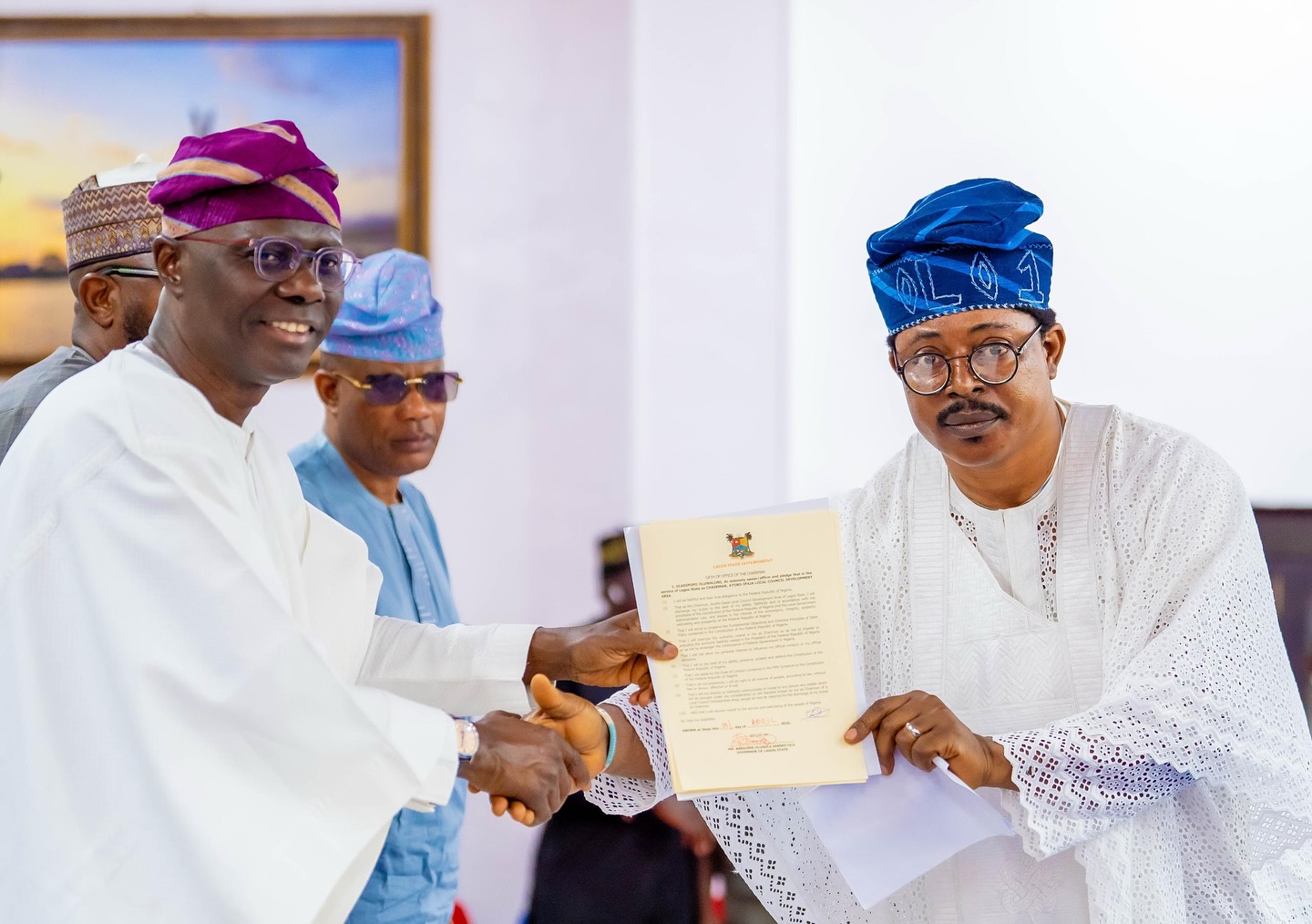
By Dipo Olowookere
The acting chairman of Ayobo Ipaja Local Council Development Area (LCDA), Mr Oladipupo Oluwaloni, popularly known as Ladi, has been sworn-in as the substantive chairman of the council.
He was sworn in on Thursday by Governor Babajide Sanwo-Olu of Lagos State at a brief ceremony attended by several loyalists of the ruling All Progressives Congress (APC) in the state.
The grassroots politician was appointed as the acting chairman of Ayobo Ipaja LCDA last month by the Governor following the long absence of his boss, Mrs Bola Shobowale.
He served as the deputy chairman of the local council before his elevation following the death of Mrs Shobowale after a protracted illness on March 21, 2025.
At the swearing-in ceremony yesterday, Mr Sanwo-Olu charged Mr Oluwaloni to listen to collaborate closely with the community as he was there to serve them.”
“Together, through unity, we can achieve our vision for a greater Lagos,” the Governor tasked the new chairman, who could not hide his excitement.
In his response, the new council chairman promised to align fully with the T.H.E.M.E.S Plus Agenda of the present administration, promising to prioritize the socioeconomic development of the people and uphold democratic values in service delivery.
Mr Oluwaloni, when he was asked to occupy the position in an acting capacity two weeks ago, said, “This is a great responsibility, and I am fully committed to upholding the trust placed in me.
“My focus will be on ensuring that governance at the grassroots remains effective, responsive, and aligned with the developmental agenda of our great state.”
-

 Feature/OPED5 years ago
Feature/OPED5 years agoDavos was Different this year
-
Travel/Tourism9 years ago
Lagos Seals Western Lodge Hotel In Ikorodu
-

 Showbiz2 years ago
Showbiz2 years agoEstranged Lover Releases Videos of Empress Njamah Bathing
-

 Banking7 years ago
Banking7 years agoSort Codes of GTBank Branches in Nigeria
-

 Economy2 years ago
Economy2 years agoSubsidy Removal: CNG at N130 Per Litre Cheaper Than Petrol—IPMAN
-

 Banking2 years ago
Banking2 years agoFirst Bank Announces Planned Downtime
-

 Sports2 years ago
Sports2 years agoHighest Paid Nigerian Footballer – How Much Do Nigerian Footballers Earn
-

 Technology4 years ago
Technology4 years agoHow To Link Your MTN, Airtel, Glo, 9mobile Lines to NIN




